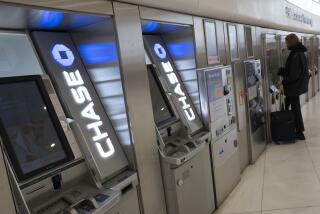Money-Market Accounts Have Nasty Surprise
- Share via
Perhaps everyone’s heard by now that those high-balance, high-yield money-market accounts may be paying consumers less than the plain old passbook accounts that require only $100 or so in deposits. But for the last several weeks, it’s been a nasty surprise to the few people who read monthly savings statements.
“I opened a money-market account late in the game,” says a Los Angeles man, “having finally realized I was a fool for having a passbook account. Now I see I’ve been a fool for having a high-yield account. Has deregulation just given us a system where bankers aren’t looking out for your money but just trying to get what they can from you?”
Deregulation aside--after all, it only allows banks to set their own rates on various offerings, saying nothing about their proper attitude--this is an unusual period for a consumer looking for the best possible savings interest at a commercial bank. At the four biggest banks in California, money-market deposit accounts requiring minimum balances of $2,500 are now paying only 5% interest, while savings passbooks requiring minimum balances as low as $100 are paying 5 1/2%. The gap is sometimes even wider: Security Pacific National Bank is paying only 4.75% on an insured money-market account with a balance below $500, and 4.9% on one with a balance between $500 and $2,500.
Meant to Fluctuate
The banks are well within their rights, however. For one thing, money-market accounts were always meant to fluctuate, set up specifically to reflect money-market rates.
“When they were first allowed, people assumed high interest because it started out in double digits,” says Donna Smith, Wells Fargo Bank’s senior vice president for marketing. “And that lasted a couple of years.” But they could have both an up side and a down side, characteristic of what Larry Williams, a Bank of America spokesman, calls “the variable rate assumption of risk,” as opposed to the lower interest but guaranteed stability of a passbook.
What’s more, bankers believe that people flocked to these accounts--often moving money from passbooks--for reasons other than interest. A money-market account offered the high interest of a long-term savings deposit and the liquidity of a checking account, with limited checks and withdrawals. “It’s a semi-transaction account,” says Jack Levine, first vice president-product management at Security Pacific, “and people recognize that.”
There’s always some question about what consumers understand, of course. A couple of years ago, nobody talked up-sides and down-sides of such accounts, and many people simply asked what would give them the highest earnings, understanding that higher balances were the price.
Change in Attitude
Even now, only the interest rate is down. Customer perception of up-sidedness is still corroborated by such account names as “Cash Maximizer” (B of A), and deposits required are still high. “I always assumed that I’d get better than a passbook,” says a San Francisco depositor, “because the passbook was the account for the $100 people.”
Customers actually seem less annoyed by a bank’s changing rates than by what they perceive to be a change in its attitude, rosily recalling a time “when your banker was there to help you with your money,” says the Los Angeles man. “I understand times change,” he wrote his bank’s president, “but frankly I felt uneasy--and a little bit had --that my bank didn’t notify me and help me help myself.”
A sweet thought. But what could banks do, given the millions of money-market accounts (half a million at B of A alone)? Any kind of special notice would “incur a substantial communications expense,” says Levine, and take weeks to prepare. Moreover, con sumers are notified of the plunging interest rate on their monthly statements, on the menu boards in banks and on bank hot lines (should anyone call). It’s probably unfair to complain, as some do, that monthly statements contain no comparative rates, or to expect a bank to advise them to ditch the account.
“We can’t advise them,” says First Interstate Bank spokesman Ken Preston. “What happens when the rate goes back up? These rates are market-sensitive and volatile.”
All good answers, but these aren’t questions of law or ethics but public relations, with more in kind to come. With banks all over town now making passbook rates variable as well, how will they sell the comparative “stability” of the passbook? And having chosen to answer current complaints with a smooth “All interest rates have fallen, you know,” what will they do with the growing anger that credit card rates remain stable, and astronomic?
More to Read
Inside the business of entertainment
The Wide Shot brings you news, analysis and insights on everything from streaming wars to production — and what it all means for the future.
You may occasionally receive promotional content from the Los Angeles Times.










